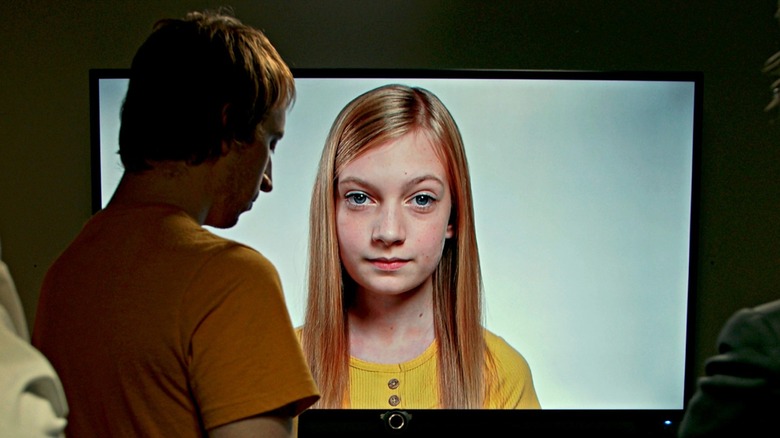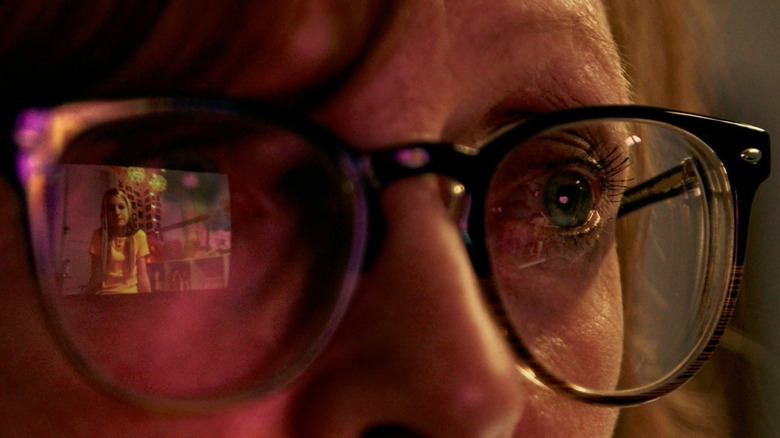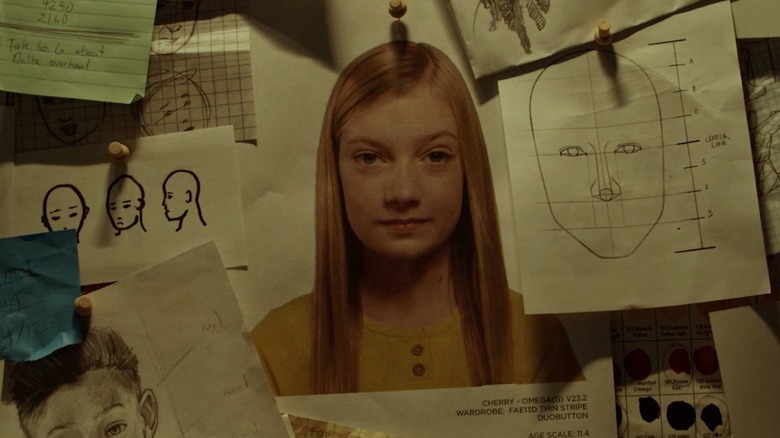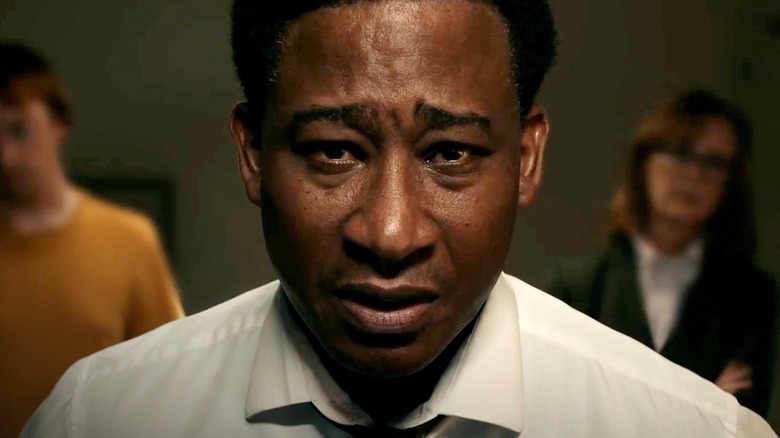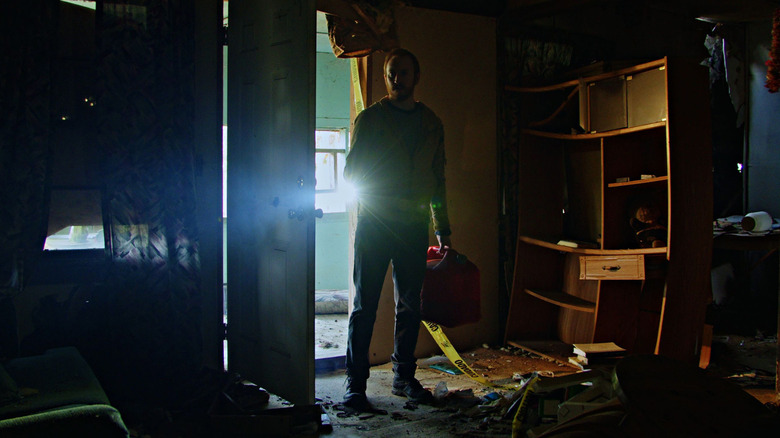The Artifice Girl Is The Only Movie Asking The Right Questions About A.I. Right Now
Franklin Ritch has been throwing audiences into existential turmoil with his debut feature, "The Artifice Girl," a character-driven film in three parts that centers on the ethics behind the humans creating and helping evolve AI-generated, responsive personalities. The film is by no means the first to tackle the ever-expanding landscape of artificial intelligence, but rather than take an action-packed approach like "I, Robot," his intimate piece of speculative fiction is far more interested in the ways our humanity is reflected by AI, for better and worse.
The Best International Feature Audience Award at the 2022 Fantasia Film Festival feels like a spiritual successor to Philip K. Dick's dystopian science-fiction novel "Do Androids Dream of Electric Sheep?" which became the basis for Ridley Scott's "Blade Runner," mixed with the intimate tension of "12 Angry Men." Ironically, there's a "Juror #8" joke in "The Artifice Girl," a clear sign that Ritch was not trying to make the next "Ex Machina," but something far more interested in philosophical dilemmas between humans making life-altering decisions.
Gareth (Ritch), a survivor of childhood sexual assault has invented a responsive character named Cherry (Tatum Matthews). She was specifically invented to resemble an 11-year-old girl, and he uses Cherry to bait and capture child abusers from around the world. His invention is beyond anything the government has ever seen, and so after a lengthy interrogation, he unites with special agents Deena (Sinda Nichols) and Amos (David Girard) to allow his creation to be used on a larger scale. Everything about "The Artifice Girl" is ethically challenging, making the thought exercises triggered by episodes of "Black Mirror" feel like child's play.
The themes present in the film have only become more relevant as AI continues to become more accessible, something that Ritch never imagined when he began writing the film in 2020.
'I was being a little optimistic'
"I wanted to have a conversation about these themes of trauma, identity, and autonomy, and I thought it would be really interesting to explore them through AI," Franklin Ritch tells me. Ritch admits he's not a super tech-savvy person, joking that he "can barely navigate Instagram." While this fact may sound like Ritch has no business writing a movie about AI, it's actually what makes "The Artifice Girl" a perfect examination of the ethical conundrums of rapidly evolving artificial intelligence — because it's written by and for an audience that might not fully understand the complexities of it all. I'm mildly terrified of AI, but I'll also be the first to admit I don't know how the hell it actually functions.
"I figured that maybe I was being a little optimistic about how fast the technology would evolve but now it almost seems like we're only months away from having some of this happen," Ritch adds. The current state of AI advancements is fortunately trapped in the uncanny valley, which means that we as viewers can look at the hands, teeth, or backgrounds of many AI-generated images or videos and know immediately that we're seeing something digitally manufactured.
But the reality is that we truly have no idea how much longer it will be until AI is indistinguishable from reality. That lack of a clear line is at the heart of "The Artifice Girl," both thematically in regard to the main character, Gareth, as well as the way his AI creation, Cherry, is perceived by the public that interacts with her. Cherry's identic appearance to that of a real child, and her growing awareness of what that says about the humans that seek her out, opens up not just Pandora's box, but whatever her version would be of a metaphorical Amazon warehouse.
'AI will be a reflection of the best and worst parts of the people that create it'
In the last year, concerns regarding AI have reached critical mass, and of the many reasons the WGA is on strike is to curb the unchecked possibilities of AI-generated scripts. This hot topic wasn't a significant concern when Franklin Ritch was writing "The Artifice Girl," another instance of proving just how quickly everything is moving. "I did not anticipate the kinds of challenges and discussions that we'd be having, especially in terms of how AI is going to affect artists, creativity, and jobs, because the film isn't really about those ideas," he says. "I think a more realistic depiction of AI now should address those [specific] questions, but I think [what] will remain relevant is exploring this idea that AI will be a reflection of the best and worst parts of the people that create it."
Every day there are countless job postings for people to help train AI, with many including language about how an employee's contribution can help "ensure" that AI is being used for good. Ritch says that this sort of thing is not surprising. "It's not like [AI is] a Terminator or HAL 9000 where it has this strange impulse to take over or dominate, I think it's going to reflect what we build it to do," he says. "So, if it's built for opportunistic, nefarious, dare I say, capitalistic reasons, that's what it's going to reciprocate." He's not wrong. Back in 2016, Microsoft shut down a chatbot testing program after it became a bigoted, racist jerk in less than 24 hours after interacting with strangers on the internet.
Yes, we do need to worry about AI taking away our jobs, but we also need to worry about what the output of those job-taking AI bots will look like.
'We should be prepared now'
In "The Artifice Girl," Cherry exists in an ethical gray area where while she isn't a legal, physical being, she is often viewed as Gareth's child. And in the same way that we can inherit the trauma of the generations before us in our family, AI does the same. "Regardless of what the technology is, and what kind of impact it's gonna have on our future, I think we should all as individuals or corporations, not that they care, should be approaching AI with compassion, integrity, and thoughtfulness because what we put in is what we're going to get out," Franklin Ritch says.
And it's not that we should be kind and compassionate while talking to Siri, Alexa, and other chatbots or trying not to hit elevator door buttons as hard because they "care" or have "feelings," but because it's a good habit in general. "An AI might try to replicate human behavior so precisely and so accurately that it is impossible to tell the difference and at that point, these questions are gonna come about," Ritch says. "So by then, we should have been practicing, we should be practicing compassion and developing habits of empathy because one day we might not be able to, we might not be able to know when we've crossed the line. We should be prepared now."
The use of AI as a vehicle for unchecked trauma in "The Artifice Girl" is at the heart of its ethical conundrum, because Gareth's inability to deal with his past directly impacts the way Cherry operates. She doesn't aspire to be human, because she knows what absolute monsters we can be. She learns by example, and what she's "seen" is the absolute worst of the worst.
The human response dilemma
As the WGA continues to strike for the accommodations the AMPTP is refusing to provide, there have been plenty of picket signs and viral memes about how AI could never replace storytellers because human beings are vital to the storytelling experience. However, when you hear executives replace "art" with "content," it's evident that those in power have very little appreciation or respect for the humans behind the projects that help them line their pockets. They truly believe AI is the answer to maximum profits, but if the possible future presented in "The Artifice Girl" is to be believed, it's only a matter of time before AI brings the exact same problems.
As Cherry is being used to target and take down people who are harming and exploiting children, many viewers not might see a "gray area," believing that these crimes must be stopped at any cost. Gareth devotes his life to protecting children from being harmed the way he was, and in turn, passes his trauma on to Cherry and unwillingly forces her into a life of abuse, victimization, and objectification. That is if the viewer views or considers Cherry a real child by the end of the film.
While AI in its current state makes that weird Ryan Reynolds/Tesla faux-commercial look like a cursed nightmare ad, it's theoretically only a matter of time before we can't decipher replication from reality. This is absolutely the future these executives want, not realizing that the more "human" AI appears, and the more "human" it responds, the more it will cost to keep them up and running. At that point, the cost of storage and upkeep to keep the AI "alive" is just the evolution of writing a human a paycheck so they can pay rent.
AI isn't the answer to all of our problems, it's a replication of ones that already exist.
